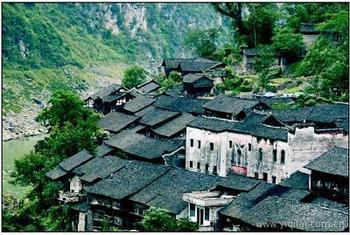
Gongtan, a town with over 1, 700 years of history, is located in Youyang Tujia and Miao Autonomous County, in the southeastern part of Chongqing Municipality. It originally sat at the confluence of the Wujiang and Apeng rivers. But with the announcement that a hydroelectric power plant would be built on the Wujiang River, a resettlement project for the town’s residents was initiated in 2005.
Four years later, the whole town had been moved to Xiaoyintan, one kilometer downstream from the riverbank. Locals took their houses with them; every brick and tile from the old town was transported to Xiaoyintan, where they were used in reconstruction. Even Gongtan’s old bluestone street was relaid at the site of the new town.
These days New Gongtan is barely distinguishable from old Gongtan. Though the relocation took some years, elderly residents say the town has the same feel as it did when it was one kilometer closer to the river, and that they now feel at home in their new “old” residences.
Goodbye, My Old Town
I enjoy old towns. To escape the frenetic activity of booming metropolises, nothing is better than to head to the countryside and hole up for a weekend in one of the country’s idyllic historic locales.
China is relatively resource-poor, and I recognize the need for the country to tap into its vast hydropower potential. Nevertheless, in the past I was skeptical of town relocations due to dam construction; surely, I assumed, reconstructed towns would be shadows of their former selves and devoid of their historical significance.
For that reason, I put off visiting New Gongtan for some time. The wealth of history of the old town attracted me, but the new town, I presumed, would be just another commercialized fake.
I was wrong. This year I passed through New Gongtan on my way to Hubei Province. I was in for a real surprise; by all accounts, it is a mirror image of the old town. Some say the Xiaoyintan area is even more tranquil and idyllic than the town’s former location.
I arrived after two days of driving along precipitous mountain roads and couldn’t wait to turn in. But after a quick dinner, my traveling companion was reenergized and curious to explore the town in depth. I joined him in ambling about the old streets, and we ended up with some splendid opportunities for twilight photography.
Evenings in old towns are bliss. China is a country of cities that never sleep. Heading out at nighttime in Beijing, Shanghai or Chongqing, neon lights rob your eyes of darkness while honking traffic assault your ears. Not in old towns, and certainly not in Gongtan. As darkness fell, the town sunk down under a blanket of the stars. Their twinkling provided the only illumination in the town’s alleyways. We saw only one or two people, who were out walking their dogs. They called out to their pets in hushed voices, as if to preserve the night’s silence.
By 10 o’clock in the evening it was cold outside. Heading back to our inn for the night, we were surprised to hear a loud banging noise disturbing the peace from afar. We were even more surprised when we realized what it was; Gongtan has kept up the ancient Chinese tradition of Night Watch. Late evening and throughout the early hours of the morning, a night watchman bangs on a wooden board every two hours. He does this to warn against theft and fire. With the knowledge that our night would be criminal-free, we fell soundly asleep.
